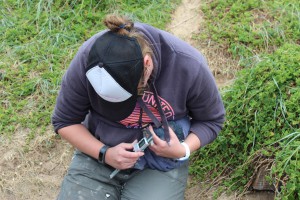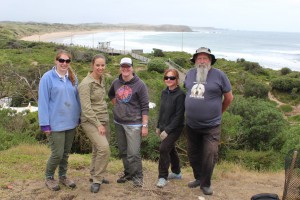Further Improving Our Penguin Handling Skills
Last week Jess joined four Warrnambool Coastcare Landcare volunteers on a trip to Phillip Island Nature Park to undertake Little Penguin handling and microchip training. During the training the group gained valuable skills in handling, weighing and measuring Little Penguins, and also learnt and practiced the procedure for microchipping.
Microchips are an important tool used in identifying Little Penguins throughout the breeding season in several colonies in Australia and New Zealand. Microchips help volunteers and researchers gather a lot of information quickly on who is mating with whom, the survival of the chicks, and how each colony of Little Penguins interacts.
A huge thankyou to Paula at Phillip Island Nature Park for taking the time to train the volunteers and chat about the current breeding season. Also thanks to WCC for sponsoring the volunteers’ travel.
Back in Warrnambool on Monday the group headed out for a breeding survey and arrival count. The breeding survey found two adult Little Penguins, one with two very small chicks, and one sitting on eggs. Volunteers counted 72 Little Penguins during the evening arrival count, giving an estimation of 120 adult penguins using Middle Island to breed. These are good signs that, despite lower numbers at last fortnight’s arrival count, a second clutch of chicks will fledge from Middle Island this season.



